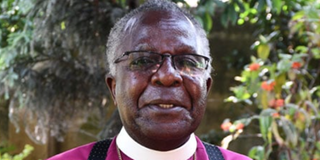
Deceased: Namirembe Diocese Bishop Emeritus Samuel Balagadde Ssekadde.
For many people, death is certain, but its coming is unknown. But Ugandan Anglican cleric Samuel Balagadde may have well known his time on earth was ending.
At a burial in Kazo district, western Uganda, his last public function, the former Bishop of Namirembe Diocese in Kampala, advised mourners to stay in Christ because no one knows when their time will come.
“Tomanyi nze addako oba gwe addako,” he said in Luganda, which loosely translates to “You never know if it will be you who dies next or me.”
In less than 24 hours, the cleric was gone on Tuesday. His family members suspect a heart-related problem was the cause. He had complained and was rushed to hospital, but was pronounced dead on arrival.
On Thursday, the Church of Uganda confirmed he had succumbed to a heart attack, a revelation made at Namirembe Cathedral in Kampala where mourners gathered to attend his funeral service.
Born Samuel Balagadde Ssekadde in January 1944, the late was at Namirembe, the seat of the Diocese he served as Bishop for over 15 years between 1994 and 2009.
Mourners described him as the man who upheld established doctrines and practices within the Church, prioritising core beliefs and resisting the waves of modernisation, but focusing on the core teachings and traditions of the Anglican church in the country.
He was credited for completing all the projects his predecessor, Bishop Misaeri Kauma had initiated, including initiatives supporting the vulnerable and those affected by HIV.
Members of the clergy who lived near his home in Entebbe, about 40km southwest of Kampala said he hosted them every Good Friday for fellowship.
“Bishop Ssekadde was a visionary leader with many ideas for strengthening the Church. He will be greatly missed as a teacher and a dedicated servant of the Church of God,” said the Archbishop of the Church of Uganda, Mr Samuel Kaziimba Mugalu.
Ssekadde grew up in a devout Christina family, attending primary, and secondary schools within Kampala, before graduating with a Bachelor of Arts in Social Work and Social Administration from Makerere University, and later pursuing a Master in Development Administration from Birmingham University in the United Kingdom.
At 24, in 1968, he got training in Theology at Bishop Tucker Theological College in Mukono, Uganda, before enrolling at Mindolo Ecumenical Foundation in Zambia.
He is credited for pushing the clergy to become self-reliant through self-help projects for financial security during their work times and after retirement, especially at a time when the church faces financial difficulties with reduced financial contributions from the members and dwindling donor support.
Even in retirement, Ssekadde continued serving the church and his death has deprived school children of a function of confirmation he was meant to preside over at the weekend.


